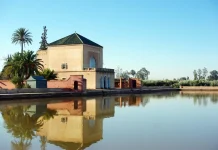“Mzungu!” This oft-heard cry directed at travellers comes from colonial times when the British were travelling from Mombasa port to Nairobi and back. To the Kenyans on the time, all of the British looked the identical and so that they thought it was the identical person going around in circles. Mzungu means something that rotates! Tourism in Kenya has come a great distance since then and this text will take a look at its development from early traders to the growing industry of today.
Foreign invasions
Around 800AD, Arab traders arrived under the command of the Sultan of Zanzibar. Mostly slave traders, these visitors weren’t probably the most welcome in Kenya’s history. The Portuguese took control of the coastal area within the sixteenth and seventeenth centuries, however the Arabs soon took it back.
In 1895, Kenya became a British protectorate. Tourism began with the colonial settlers within the early 1900s. The settlers enjoyed going “on safari” to hunt The Big Five (lion, leopard, elephant, rhino and buffalo). Luxury camping with quite a few servants was the usual, they usually either travelled by motor automobile or on horseback. The movie Out of Africa has some excellent scenes of a typical safari during this time.
Independence
In the Nineteen Sixties and 70s tourism throughout the continent was hit by independence struggles, however the hunting safari remained popular.
Shortly after independence, the Kenyan government realised the tourism potential of the country and the impact on the nation’s economy if the industry were to be developed. The important obstacle nevertheless was the shortage of qualified people. So the federal government, along with the Swiss Confederation, established a training program which produced the primary Hotel Management students at Kenya Polytechnic in 1969. In 1975, the Kenya Utalii College was founded as a dedicated hospitality and tourism training institute.
Promotion Abroad
Also in 1975, the Africa Travel Association (ATA) was established to help the brand new African nations develop their tourism infrastructure. In 1980, the Association for the Promotion of Tourism to Africa (APTA) was born out of the ATA. It seems to have much the identical objectives, namely to advertise education of tourism to African business and to advertise Africa as a destination to the remainder of the world.
Election Disaster
In the wake of the 2007 elections, inter-tribal violence caused upheaval in Kenya. Although not one of the violence was directed towards foreigners (it was tribes fighting to have their man within the presidency) it impacted the industry significantly. Tourism slumped by about 50%.
Onward and Upward
Despite the violence early within the yr, April 2008 saw Kenya win the Best Leisure Destination award on the World Travel Fair in Shanghai. In 2010 Kenya received over a million arrivals, a record number to that point.
Last yr, each President Uhuru Kenyatta and Vice-President William Ruto pledged their commitment to growing Kenya’s tourism industry during their inauguration speeches. Currently Kenya is receiving roughly 1.5 million tourists a yr. But Ruto stated that this government is committed to growing that number to 3-5 million to be able to turn across the economy and increase jobs for young people.
At the 2013 World Travel Awards (Africa), Kenya was well-represented among the many winners. The Kenya Tourist Board won Africa’s leading tourist board award. Nine accommodation categories were taken by Kenyan lodgings in categories similar to eco, green, meetings and conferences, spa, and tented safari camp. The Maasai Mara was named Africa’s leading national park.
On the world stage, Kenya was also well-represented within the nominations within the categories: golf destination, tourist board, eco-lodge, green hotel, recent hotel, resort, spa resort, and personal game reserve. Kenya won the World’s Leading Safari Destination.
Kenyan tourism is growing from strength to strength. Long gone are the hunting safaris; now the one shots taken are with a camera. Despite the phobia attack and airport fire last yr, Kenya has been recognised globally as a number one destination. Security stays a problem for a lot of travellers coming to Kenya but, with the federal government’s renewed commitment to developing the industry, it’s a protected place to holiday. And as the overall population recognises and profits from the economic advantages of tourism, the support of the nation will only increase Kenya’s attractiveness as a destination.
Escape the ordinary and discover the extraordinary! From bustling cities to serene landscapes, every journey begins with a single step—let us guide yours. Enjoy curated itineraries, hidden gems, and hassle-free bookings designed for explorers at heart. Whether it's a weekend getaway or a globe-trotting adventure, your Next unforgettable experience is just a click away.










